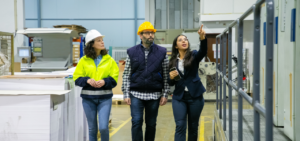*Manufacturing is defined as an entity that engages in the mechanical, physical, or chemical transformation of materials, substances, or components into new products, assembled goods or assembled component parts of manufactured products, or like-new rebuilt goods. Eligible Applicants that are not SMMs cannot apply for the Small-scale Award Track (SAT), regardless of Total Project Cost (TPC).
** As of September 2025, third parties such as Energy-as-a-Service and Sustainability-as-a-Service companies are not permitted to apply on behalf of a manufacturing facility seeking RISE PA SAT funding. If applicants require support with completing RISE PA SAT applications, please contact the PennTAP RISE PA team. If qualified to do so (see Appendix E of the RISE PA SAT grant guidelines), these entities may continue to complete the technical assessment report for applicants.
Grantee must have a Unique Entity Identifier (UEI) as required by 2 CFR Part 25 and 2 CFR 200.332(a)(1). Subrecipients are not required to complete full System for Award Management (SAM) registration to obtain a UEI. Information regarding obtaining a UEI is available at sam.gov and in EPA’s General Term and Condition “System for Award Management and Universal Identifier Requirements” of the pass-through entity’s agreement with the EPA.
The Pennsylvania State University intends to make awards to recipients through Subaward agreements. These Subawards will be cost reimbursable and contain required flow down terms and conditions from the Commonwealth of Pennsylvania and the U.S. Environmental Protection Agency. The Pennsylvania State University will retain ultimate control and responsibility for the project, and the subrecipient will be bound by these conditions and any other requirements applicable in the performance of the project. These terms will be non-negotiable.
All subrecipients shall maintain current registration in the System for Award Management at all times during the project.
Base grants cover 50% of the total project costs, up to max $500K.
Applicable Project Types
Projects submitted to the SAT must reduce GHG emissions through the installation of one or more of the following technologies:
-
- Electrification technologies such as low- or zero-carbon process heat systems, electric heat pumps, and other heating systems based on electricity
- Energy efficiency technologies, including those that reduce direct fuel or electricity use, such as thermal storage, waste heat recovery, industrial heat pumps, combined heat and power (CHP) systems; utilize insulation, sensors or controls, deploy smart energy management systems, or other advanced energy efficiency technologies
- Industrial process emission technologies, and waste reduction technologies such as those that reduce waste in industrial applications, including advanced recycling approaches
- Fugitive emissions reduction technologies such as regenerative thermal oxidizers and ventilation air systems
- Fuel switching technologies that enable the transition to low carbon fuels such as fluidized bed biomass furnaces, solar-thermal heating systems, clean hydrogen and direct reduced iron shaft furnaces designed or retrofitted for hydrogen-based reduction
- On-site renewable energy technologies such as solar photovoltaic systems, wind turbines, micro-hydropower, or geothermal; a. Note: Only the portion of a renewable energy system generating electricity that is required on-site at the SMM will be eligible for funding
- Carbon capture, utilization, and storage (CCUS) technologies such as flue gas carbon capture systems or calcium looping carbon dioxide capture systems
- Other technology that reduces industrial GHG emissions, as determined by RISE PA



